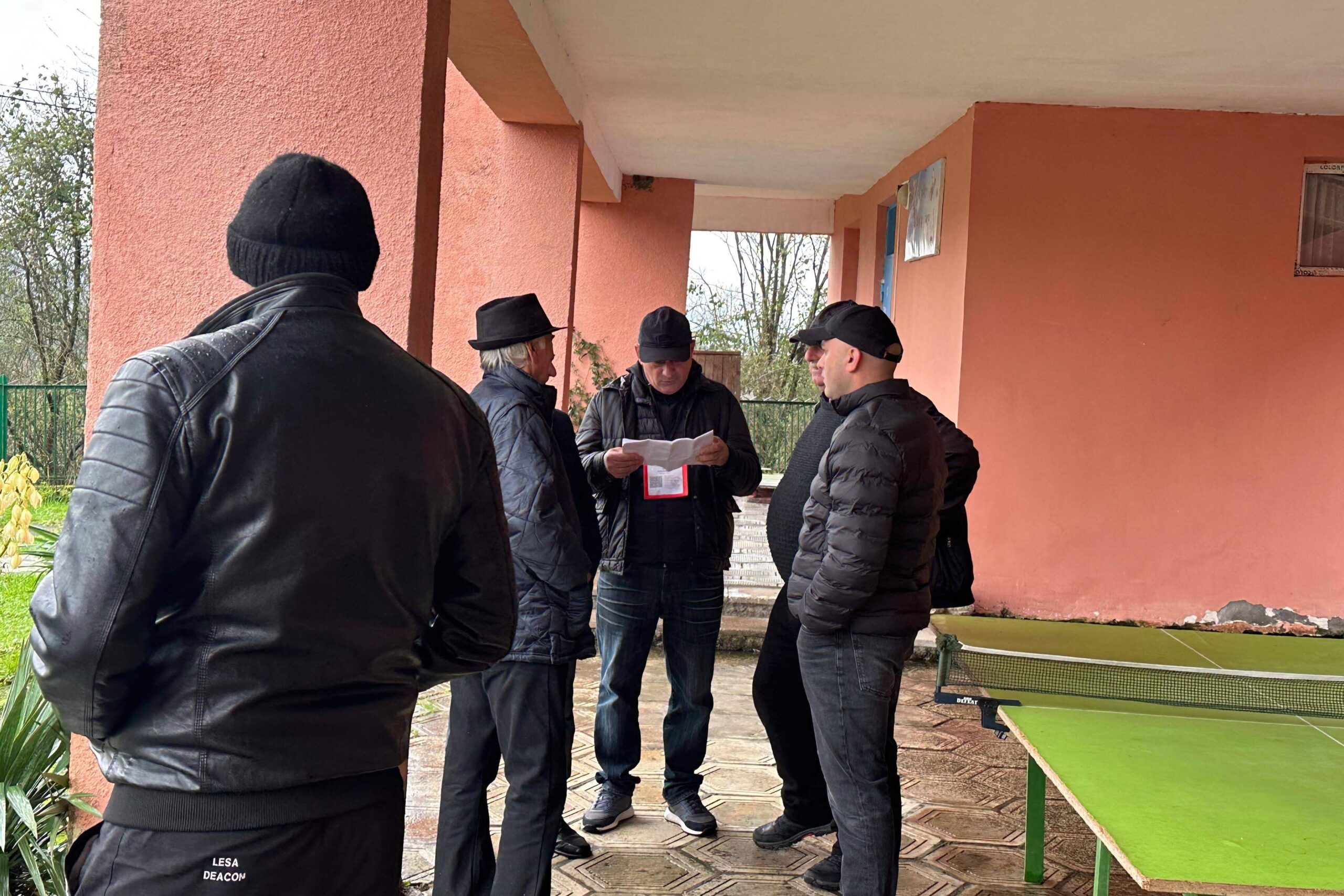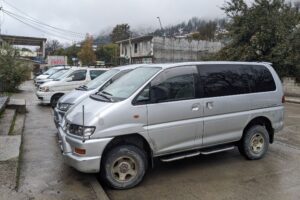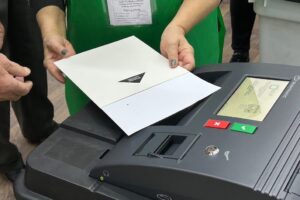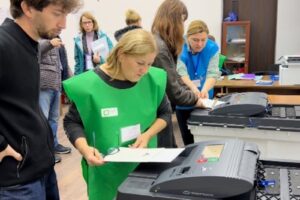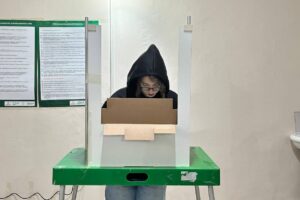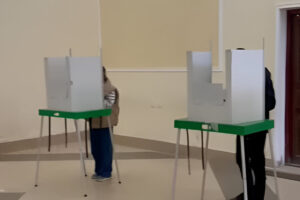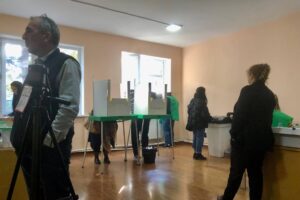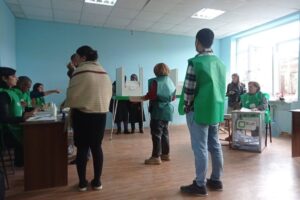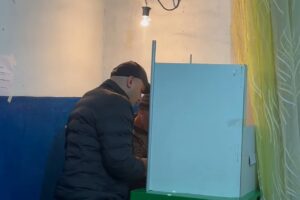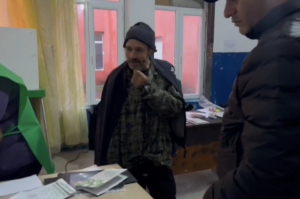
OC Media collected evidence and first-hand accounts of an array of violations on the Georgian parliamentary election day.
On the election day, OC Media dispatched a dozen journalists into several regions of Georgia to monitor the voting and counting process. The following details only the violations witnessed first-hand by our reporters.
The violations varied from pressure and intimidation to outright vote buying. Groups of men patrolling the outside of polling stations were a universal occurrence. Small towns and rural areas were more prone to violations, although major irregularities were observed in cities, too.
Obstruction of journalist’s work
OC Media’s correspondents reported being prevented from filming inside several polling stations by the election commissions in the cities and towns of Tbilisi, Bolnisi, and Telavi. At the polling station No 1, Isani District, Tbilisi, our journalist wasn’t allowed to film the vote count until she and an independent observer argued the case. At the other two locations — polling station No 11 in Nakhiduri village, Kvemo Kartli, and polling station No 8 in Telavi, Kakheti, reporters weren’t allowed to take photos or videos at all.
In the village of Iormunghalo, Kakheti, men gathered in front of the polling station No 34 tried to grab the phone of OC Media’s reporter as she took a picture of them. One man threatened to break her phone and forced her to delete a picture. One of the men gathered was an observer from Georgian Dream.
OC Media’s journalist covering the voting at polling station No 11 in Mtskheta, was not allowed to film longer than ten minutes by the commission chair. When reminded that journalists were allowed to film from a designated spot chosen by the chair after ten minutes, the chair replied that this was only allowed if the journalist had a tripod. The law regulating filming inside polling places doesn’t make such a distinction.
At polling stations No 1 and No 2 in Isani District, Tbilisi, OC Media’s reporter was verbally harassed by men gathered out front. Some took photos of her in an apparent attempt to intimidate her. Some wore Georgian Dream representative badges.
A State Security Service official identified by OC Media as Giorgi Mgeladze called the father of our reporter covering the vote at polling station No 13 in the village of Zomleti, Guria, asking him to have his daughter blur his face in violations in photo and video footage. The reporter’s father was the head of the commission at that polling station.
Coordination and intimidation
In the vicinity of nearly all polling stations, OC Media noted the presence of groups of people who remained there throughout the election day.
In the village of Iormughanlo, Kakheti, OC Media saw local men gathered in front of the polling station No 35 collecting lists of voters. They were also in charge of delivering voters to the precinct, mainly women. In the same village, at the polling station No 30, OC Media heard a female coordinator giving updates about the number of women brought to the polling station over the phone.
In front of the polling station No 1 in Borjomi, a woman stood with what appeared to be a list with some positions crossed out, making calls to phone numbers from the list.
In the village of Zomleti, Guria, ruling party official Amiran Khajibegov had unrestricted access to the polling station throughout the day. A State Security Service official, identified as Giorgi Mgeladze, was present right outside the polling station. An alleged coordinator of the youth wing of Georgian Dream was caught illegally ‘assisting’ a voter — her father — in the voting booth.
The deputy head of the Chokhatauri Municipal Council (‘Sakrebulo’), Temur Khukhunaishvili, was also documented ‘assisting’ voters in the booth at the same location. He also was seen intimidating an ISFED observer by inquiring what village she was from and who her parents were.
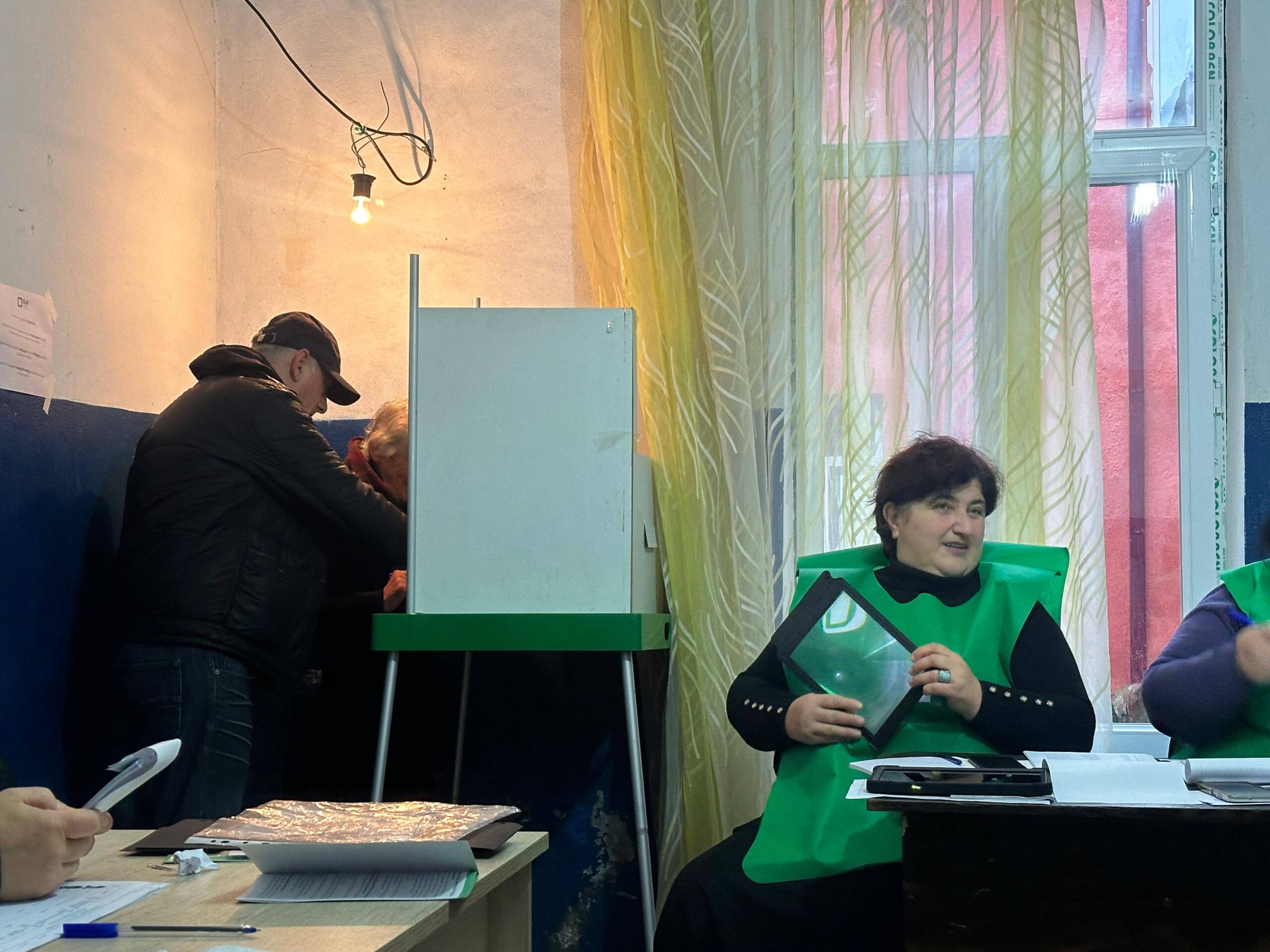
In the village of Nakhiduri, Kvemo Kartli, OC Media recorded a Georgian Dream representative, Musa Gurbanov, standing next to ballot boxes and giving instructions to voters. While an independent observer objected and a debate broke out, several people rushed to vote at the same time.
In the village of Geta, Kvemo Kartli, OC Media observed commission members calling people on the phone and urging them to come and vote for Georgian Dream. Many people coming to the polling stations were unfamiliar with the voting process. In the village of Dzveli Kveshi, Kvemo Kartli, confused voters who appeared at the precinct would ask who to vote for and be instructed to vote Georgian Dream.
In the village of Iormunghalo, Kakheti, OC Media observed confused voters at polling stations No 30 and No 31, asking each other and the commission members who they were supposed to vote for, and the answer was 41 (Georgian Dream).
In the village of Tsikhisdziri, Mtskheta-Mtianeti, deputy mayor Tamaz Poladashvili and his representative, Dima Nizharadze, were present within ten metres of the polling station, monitoring the situation and intimidating voters. They wore observer badges, even though they shouldn’t be allowed to.
At polling station No 9 in Zugdidi, Samegrelo, a man named Giorgi Tsulaia physically attacked commission members and observers. According to his badge, he was an observer from the NGO the Georgian Institute for Training and Development. OC Media witnessed the man speaking loudly and aggressively giving instructions to commission members to manage the situation and to ensure voters cast their ballots, as he claimed.
In Zugdidi, Natela Kvitia, a woman with visual impairment who voted at home, told OC Media an election official circled 41 (Georgian Dream) against her will on her ballot, and discarded the ballot only after a protest by her granddaughter. OC Media confirmed with the chairperson of Zugdidi’s polling station No 2, Mariana Kvaratskhelia, that the commission member visiting Natela was a Georgian Dream representative.
Unusual voter mobilisation was visible in multiple areas, such as multiple cars and minibuses at polling stations in Bolnisi, Telavi, Kutaisi, and Mestia.
Georgian Dream observers and people identified as their ‘friends’, were seen loitering throughout the day at the entrance to polling stations No 1 and No 2 in Isani District, Tbilisi, drinking alcohol and talking to voters in Armenian. One of them tried to run away when our correspondent asked for his ID in front of the camera.
Vote buying
One voter told OC Media that representatives of the local government from Georgian Dream, Temur Khukhunaishvili and Amiran Khajibegov, bought votes at polling station No 13 in the village of Zomleti, Guria. She said her relative was paid ₾60 by Khukhunaishvili to come to the village and vote for Georgian Dream.
OC Media also has a video depicting a conversation about alleged vote buying also from Chokhatauri.
At the polling station No 1 in Chokhatauri, Guria, OC Media also caught on video a phone conversation where one voter appeared to be bargaining an additional ₾20 for their vote.
In the village of Tekalo, Kvemo Kartli, a local observer named Kamil Mustafayev faced harassment from locals and commission members over his claims that he witnessed vote buying as well as voters taking pictures of their ballots as the proof of who they voted for. The intimidation was severe — he was told to leave the village and never return under threat of violence. After our correspondent left the polling station, she received a report that Mustafayev and another observer had been beaten up and subjected to homophobic abuse. Despite being called the police did not show up.
When the counting was completed in Tekalo, a man was waiting outside and some people reported to him directly. OC Media determined that this person is Vugar Mamedov, an advisor to the mayor of Marneuli.
Vote secrecy
At the village of Dzveli Kveshi, Kvemo Kartli, polling station No 42, observers weren’t allowed to monitor the voting process. Voters were forced to insert their ballots into the counting device in an open form, revealing their vote to everyone present.
In other cases, commission members were seen inserting ballots for voters.
OC Media noted that in many cases, after a voter marked their choice on the ballot, the ink would bleed through the paper, making their choice visible to commission members and observers. It was especially visible for those voting for number 4 or 5 on the list (the opposition Coalition for Change and Unity — National Movement, respectively), as the envelopes did not fully cover the ballots.
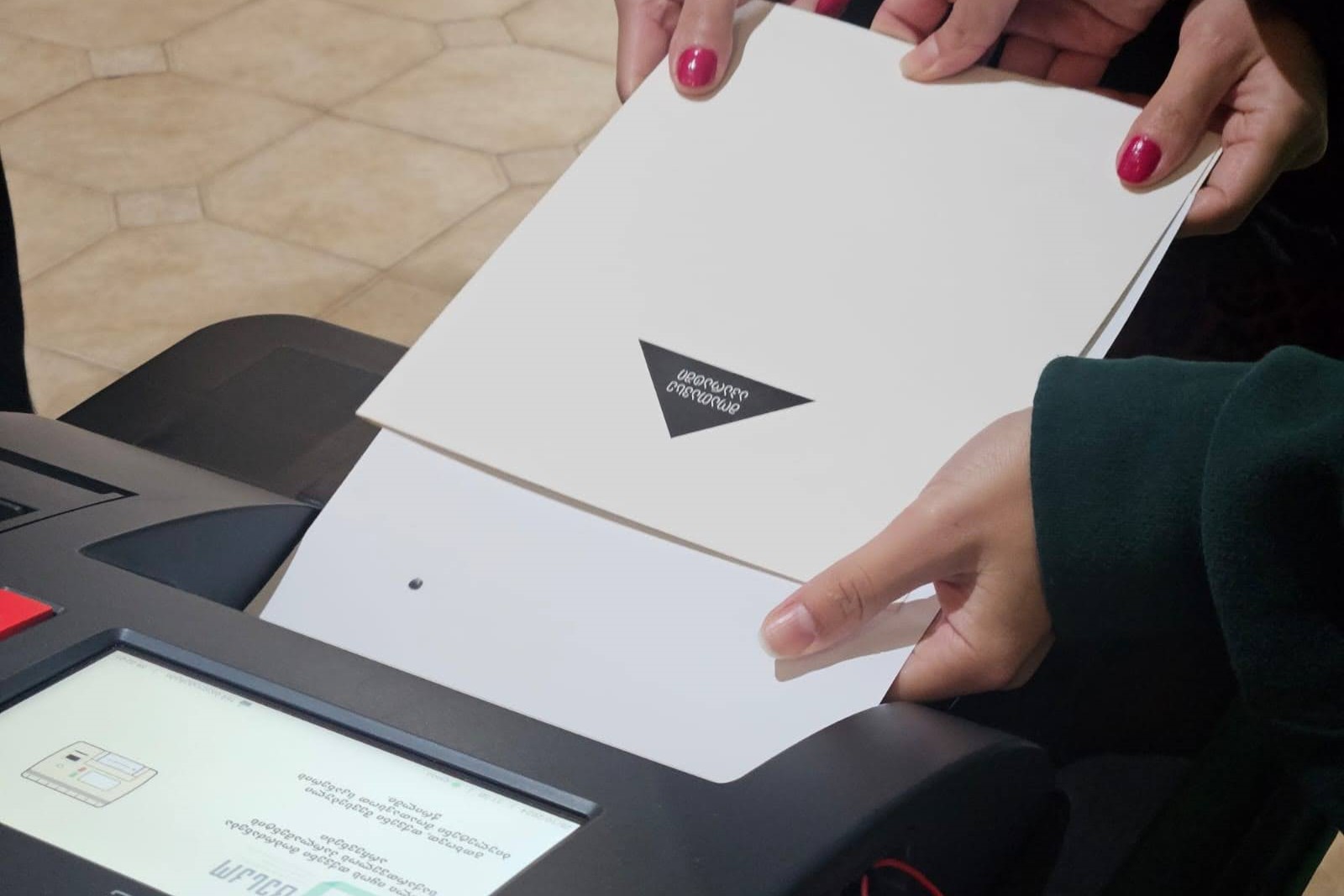
On many occasions, additional cardboard was installed on voting booths, creating a barrier high enough to allow taking photos inside unseen. Taking a photo of one’s ballot is an essential part of vote buying, as a voter is requested to show the evidence of their vote to the vote buyer in order to receive payment. In past elections, the booths concealed voters, making it impossible to see them in the cabin. For the election this year, the CEC lowered the barrier to make it easier to detect if voters were taking a photo of their ballots, as allegations of state employers asking their employees to take a photo of their ballot have been common.
At multiple locations, two people were present in voting booths without reaction from commission members.
Multiple voting
In Kutaisi, double ballots were handed out to voters. It was discovered when the ballot-counting machine failed to accept the ballots. After the issue was identified, the machines resumed operation. Extra ballots were also ‘sometimes and accidentally’ given to voters at the polling station No 15 in Batumi, as local observers claimed.
An OC Media reporter saw a woman try to vote twice at the polling station No 1, Isani District, Tbilisi. At the polling station No 2, OC Media found a man who had already voted re-enter the polling station twice. The man claimed he returned ‘to help his neighbour’, and then ‘his brother’. The commission members let him in without checking his ID.
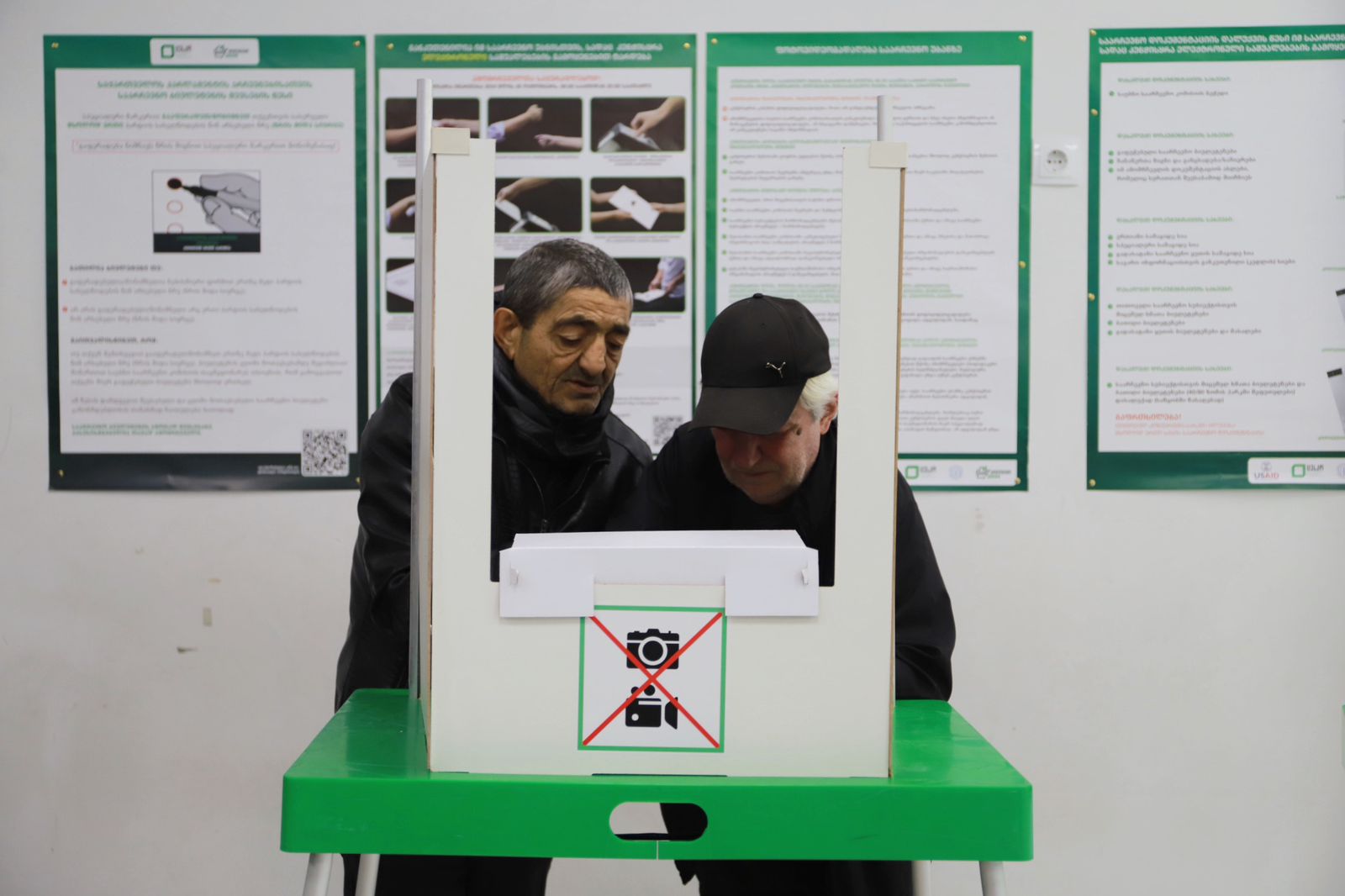
At polling station No 10 in Batumi, a woman had traces of a substance on her hands that looked like the marking ink. She claimed it was some sort of liquid from a nail salon she worked at. She was allowed to wash her hands and vote.
At another polling station in Batumi, No 18, a party representative told our journalist there had been ‘insignificant violations’. When the journalist further inquired about them, the representative mentioned that a voter had ink visible on his hands, explaining it was because he ‘ate a tangerine or something’. After washing his hands, the commission members voted on whether he could vote, and he was ultimately allowed to.
At multiple polling stations throughout the country, OC Media found voters weren’t properly checked for traces of ink.
At the polling station No 69 in the Sadakhlo village, Kvemo Kartli, our correspondent found that the man responsible for ballot stuffing, the footage of which circulated widely in Georgian media, was the deputy chair of the local municipal assembly from Georgian Dream, Rovshan Iskandarov.
OC Media observed one case of a person with a disability voting without an ID. This person voted with the assistance of someone who claimed to be their neighbour. This person wasn’t allowed to enter the room as he had already voted and did not represent any organisation. Later, Giorgi Mgeladze, the State Security Service official who was present near the polling station throughout the day coordinating the situation, brought this person’s ID to the commission, claiming he was their cousin.
